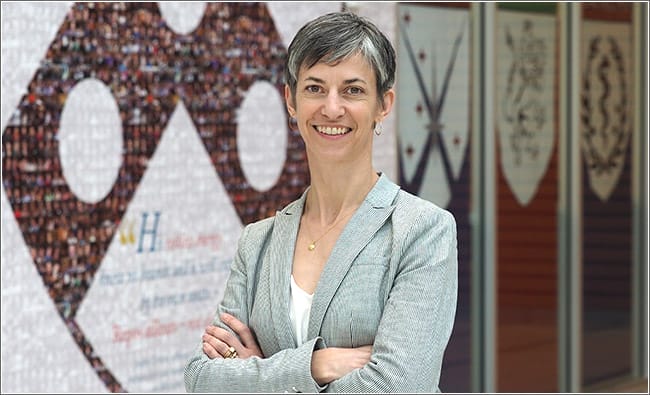Eighteen years ago, when the young Penn physician Rachel Werner M98 RES01 GRW04 began her PhD studies in the Wharton School/Leonard Davis Institute of Health Economics (LDI) health care management program, it was beyond her imagination to think she might one day run LDI.
“Back then,” Werner remembered in an interview in her new second-floor LDI office, “David Asch was in charge of LDI and I was never going to be David Asch. Frankly, even a year ago, I couldn’t have imagined I would be doing this.”
“This,” of course, is her recent appointment as LDI’s executive director, the first physician-economist and first female to hold the position in the health services research (HSR) organization’s 51-year history.
“The physician–economist perspective is a perfect fit for LDI,” said Werner. “It presents a great opportunity to cross the divide between the main Penn campus and the medical school, to further develop the bridge between all of Penn’s schools that has defined so much of LDI’s past success in fostering interdisciplinary collaboration. It also gives me insight into the importance of using rigorous economic methods to answer questions that matter the most to patients.”
As to being the first woman to head LDI—she has mixed feelings.
“Always a Challenge”
“I think it’s always a challenge to be the first woman to do anything,” Werner said. “I would like to be thought of as an executive director first, and part of that is being the first woman. But it’s really important to have visible female role models for women who are aspiring to other leadership positions or aspiring to careers in this field. I often hear from the women I mentor that it’s important to them to have people they can look to and say ‘there is a woman who has succeeded and I want to be like her.’”
“Rachel is one of the smartest health services researchers I have ever met. As a woman, she is a role model for all of us,” said Judith Long, MD, chief of the Division of General Internal Medicine, Perelman School professor, and LDI senior fellow. “It is important that we have smart, capable women in leadership positions. Each barrier that is broken makes it easier for all of us to succeed. I know Rachel will be great as a leader of LDI, and I am looking forward to seeing how she moves the Institute forward.”
As the new head of the country’s oldest academic HSR center, what does Werner see as some of the field’s most important challenges?
“I think the biggest struggle we’re facing right now is the cost of care,” she said. “Getting a handle on delivering high-value care is one of the continuing challenges we will face over the next decade. Other challenges include addressing disparities in care and improving care for vulnerable populations, both of which we have to deal with more directly.”
Social Determinants
“In terms of addressing the social determinants of health, there are bright spots,” she said. “You can find programs that are successful and doing a great job—Shreya Kangovi’s community health workers program is one example of that. But we are at the very beginning of a very long road. Can we fully address the social determinants of health in the next decade? No, probably not, but I think we need to continue trying and make as much progress as possible.”
Werner, who has been deeply involved in health services research for nearly two decades, notes the field has undergone major changes, particularly in its size and penetration into nearly every area of health care-related academic, clinical, and business activity.
“There is just so much happening in HSR, it continues to be a very exciting place to be as a researcher,” she said. “The conferences that I go to are bigger than they used to be. There’s so much energy around questions and around finding credible answers to these questions, particularly in the wake of the passage of the Affordable Care Act and the increasing focus on health care costs and value. When I look across the country, I see more and more universities investing in building an HSR infrastructure and mobilizing the capital to use that infrastructure.”
Changes Across HSR
Launched 51 years ago at the dawn of the modern health services research age, LDI used to be the exclusive nexus for Penn HSR academic pursuits. Now, however, it sits at the center of a campus-spanning constellation of HSR initiatives established within various Penn departments and centers. In Penn Medicine, for instance, health services research originally grew out of the Division of General Internal Medicine. But now, in-house HSR operations have been set up within a growing number of specialty areas including cardiology, oncology, surgery, anesthesiology, and pediatrics.
“The leading edge of HSR in medicine is in the specialties,” Werner said, “and there’s an exciting new sense of importance of what can be answered with health services research across all of them.”
Werner, MD, PhD, arrived at Penn in 1994 to begin medical school after graduating magna cum laude from Macalester College in Minnesota. She earned her MD in 1998 and her PhD in health economics in 2004. She is currently a professor of both medicine at the Perelman School and health care management at Wharton, and a member of the National Academy of Medicine. Prior to her new appointment, she long served as a member of LDI’s executive committee.
After graduating with her PhD in late 2004, Werner was sought by several universities but ultimately elected to remain at Penn.
“Tremendous Resources”
“LDI is part of the reason I stayed,” she said. “It has such tremendous resources for doing research in the area of health policy and health economics, and it offers an easy way to become part of the larger community of Penn researchers.”
In 2005, she joined the faculty as an assistant professor of medicine as well as an LDI senior fellow. At that time, LDI was expanding its digital infrastructure to provide LDI senior fellows easier access to large-claims databases in a secure computer environment. It was exactly what Werner needed for her own research using Medicare data. Since then, she has played an important role in expanding LDI data services. Until her appointment as executive director, she was director of the LDI Health Economics Data Analyst Pool, which provides LDI fellows with masters- and PhD-level statistical analysts. HEDAP currently has nearly two dozen full-time analysts who assist LDI senior and associate fellows in using the big data sets held in LDI’s Health Services Research Data Center.
Throughout her career, Werner has been a practicing physician at Philadelphia’s Crescenz Veterans Affairs Medical Center and co-director of the Center for Evaluation of Patient Aligned Care Teams.
Veterans Medical Center
“I like practicing at the VA because, from a clinical perspective, the Philadelphia VA serves as a safety-net provider for many veterans,” Werner said. “It’s committed to providing high-quality care to improve the health and outcomes of veterans. It also has a long history of supporting important and high-impact research in health services and has historically been on the leading edge of reforming health care delivery. For example, the VA led the country in using an electronic health record and in quality measurement. It has provided me with an opportunity to do research that has a direct and visible impact on the delivery of clinical care and, by continuing to see patients, informing the research questions I ask.”
According to colleagues and mentors, Werner’s potential has been obvious since she arrived. In 2005, her Wharton doctoral dissertation—”Testing Theories of Discrimination in Health Care: Evidence from New York’s CABG Report Card”—was selected as the Outstanding Dissertation of the year by AcademyHealth. That made it the year’s best doctoral dissertation in the nation in the area of health services research.
Her dissertation adviser—Wharton professor Mark Pauly, PhD—said “Rachel’s dissertation was the only one, in my memory, where the committee did not have to check the box ‘make revisions.’ It was perfect as written—it was that polished and that impressive.”
That dissertation turned into an article in Circulation, a Perspective in JAMA, and launched a research agenda that investigated the unintended consequences of quality improvement incentives. Her work was among the first to recognize the unintended consequences of public reporting of quality information and pay-for-performance programs, which in some cases may worsen racial disparities.
Research Focus
In recent years, Werner’s research has focused on analyzing how health care payment and organization affect post-acute care—the continuing care services many patients require after they are discharged from a hospital into rehab facilities, skilled nursing facilities, or home health programs.
“Under recent payment reforms, there is a trend toward sending patients home rather than to post-discharge settings such as skilled nursing facilities after hospital discharge to try to save money,” said Werner. “But what does that do to patients’ health? What does that do to caregivers? There are a lot of questions that haven’t been answered in this area.”
The impact of her research over the last decade and a half has been recognized with numerous awards, including the Alice S. Hersh New Investigator Award; the John M. Eisenberg Article of-the-Year Award in the Health Services Research journal; Best Article-of-the-Year at AcademyHealth; Best Published Research Paper by the Society of General Internal Medicine; and the National Science Foundation’s Presidential Early Career Award for Scientists and Engineers for demonstrating “exceptional potential for leadership at the frontiers of scientific knowledge.”
Econometric Techniques
“More than any other scholar I know,” said Penn Medicine professor David Asch, MD, MBA, who was one of Werner’s mentors, “Rachel Werner has effectively linked the worlds of quality measurement and health equity—using the best econometric techniques to reveal challenges and opportunities for better care and for social justice. And I have never seen anyone better at anticipating tomorrow’s policy questions and producing actionable research toward those questions.”
Werner went on to make mentoring trainees a significant part of her own career. She was, until her appointment as LDI’s new chief, co-director of Penn’s Master of Science in Health Policy Research program, in which she was awarded a 2018 Excellence in Teaching award. MSHP is a two-year curriculum designed for advanced studies in health services and policy research.
“I had great mentors when I was junior faculty, and I’m very happy to be able to pay that back by mentoring the next generation of researchers,” Werner said. “Mentoring enthusiastic students and junior faculty has been very gratifying. It’s nice to be reminded how exciting research can be in their eyes, and even nicer when these trainees learn new skills that allow them to grow into successful researchers.”
“The Right Leader at the Right Time”
In ending her interview, Werner gratefully acknowledged her research colleague and predecessor Daniel Polsky, PhD, who served as executive director of LDI for six years before leaving to become a distinguished professor of health economics at Johns Hopkins Bloomberg School of Public Health.
“Dan was very successful at leading LDI, and I want to be able to build on that and continue what he started,” said Werner. “My goals for LDI relate to my goals for Penn, which are to make Penn the national leader in the field of health economics and to make LDI an even more vibrant, collaborative, and collegial place where people want to come and work together and produce the highest quality research in the country.”
Upon the announcement of her appointment, Polsky GR96 noted in a tweet that Werner is “[t]he right leader at the right time. She will take this historic and influential institution to new heights.”
Editor’s note: This post was originally published by the Leonard Davis Institute of Health Economics as part of their eMagazine, the LDI Health Economist. View the original post here. And read more about Werner and other outstanding Wharton PhDs in our Spring/Summer 2018 feature story.


























